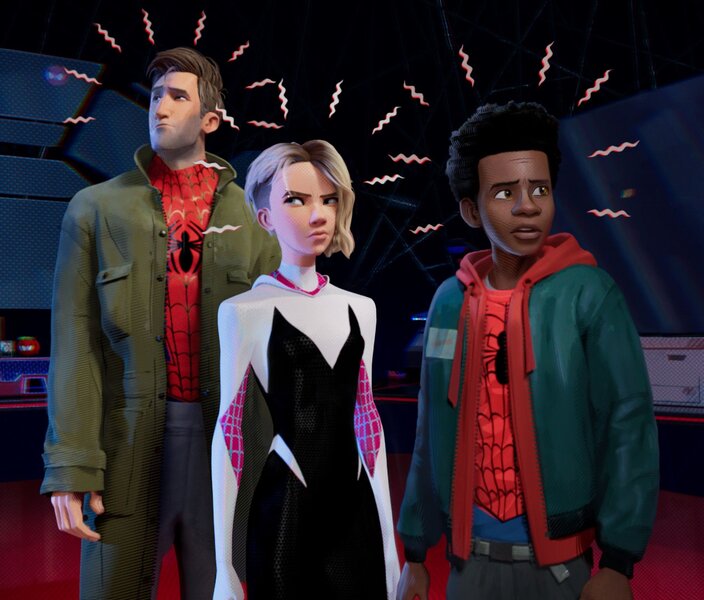Create a free profile to get unlimited access to exclusive videos, sweepstakes, and more!
Spider-Man doesn’t have to be straight or white and neither does any other superhero

In 2015, Sony Pictures Entertainment went through the public relations crisis to end all public relations crises when hundreds of thousands of their private files and emails were leaked online. This unprecedented reveal of data made for months of tabloid headlines and also exposed some of the strange, depressing but usually mundane ways that the most influential entertainment structures on the planet make bad decisions.
Such highlights included legendary producer Scott Rudin calling Angelina Jolie "a minimally talented spoiled brat" and comparing director David Fincher to Hitler, Cameron Crowe making transphobic jokes about Caitlyn Jenner, and the revelation that the women in American Hustle were paid far less than their male co-stars. It wouldn't be an exaggeration to suggest that the Sony leak still reverberates through Hollywood to this day, and one way its revelations remain relevant is through their most prized intellectual property: Spider-Man.
Spider-Man is the only Marvel property that Sony owns outright, although they recently entered a joint custody deal of sorts with Marvel Studios, thus allowing Peter Parker entrance into the Avengers and their expanded universe hijinks. Sony has struggled to make Spider-Man work as an independent entity in the current superhero age. Sam Raimi helped to birth this era with his trilogy, then the Andrew Garfield duology quickly spluttered out, and soon the franchise was being rebooted once more. While Tom Holland’s tenure has seen great success, it seemed hard for Sony to avoid the fact that people just didn’t seem as enthused for a Spidey movie happening outside of everything going on in the gargantuan MCU. Now, the company seems on surer footing. Tom Holland is arguably the most critically adored Peter Parker of the live-action era, hype is high for Spider-Man: Far From Home, and now Sony has struck unexpected gold with Venom, thus ensuring their continued investment into a Spidey-villain cinematic universe. The future is bright, and it’s happening through the most unexpected turns.
But there’s still one area where Sony, as evidenced by the leak, seems unwilling to evolve when it comes to their friendly neighborhood Spider-Man: He has to be a straight, white guy.
This isn’t a conspiracy or a conclusion reached by conjecture: This is literally in Sony’s guidebook for the character. A legal licensing agreement between Sony and Marvel detailed "Mandatory Spider-Man Character Traits", including his gender (male), his rejection of drugs, smoking, and alcohol abuse, and that he is "not a homosexual (unless Marvel has portrayed that alter ego as a homosexual)". Peter Parker's character traits also reinforce him as "Caucasian and heterosexual". As noted by Gawker, this document of mandatory character requirements went into effect in September 2011, a month after Miles Morales was introduced in the comics, which means that legal agreement cannot help but leave a bad taste in fan’s mouths.This story returned to the headlines when former Spidey actor Andrew Garfield gave an interview reflecting on his time as the character. While he has overall very positive memories of playing Peter Parker, he also noted how those legal character requirements stifled him. Speaking to The Independent, he said, "There was an interview I gave where I said, ‘Why can’t Peter explore his bisexuality in his next film? Why can’t [his girlfriend] MJ be a guy?’ I was then put under a lot of pressure to retract that and apologize for saying something that is a legitimate thing to think and feel. So I said, ‘OK, so you want me to make sure that we get the bigots and the homophobes to buy their tickets?’”
It’s unknown as to whether Sony’s licensing agreement remains so stringent in 2019, but it would certainly be foolish if it were. It was always silly at best for Sony to force a legal requirement for Peter to be a straight white guy, but in the post-Into the Spider-Verse age, it’s especially naïve. The Oscar-winning cultural juggernaut of Spider-Man: Into the Spider-Verse not only made Miles Morales a mainstream hero but defined the franchise as one of malleable possibilities, one where there was no such thing as a One True Spider-Man.
This is nothing new in comics, of course, but in the current era where minutely detailed continuity has become the superhero fetish of sorts, it’s become less of a priority for the genre. There’s one Spider-Man, one Iron Man, one Captain Marvel, and so on, even if that’s not how it was in the comics. Even for Sony, as Miles Morales and friends make them all the money, the status of Peter Parker must seemingly be set in contractual obligation. Spider-Man’s not the only hero whose whiteness and heterosexuality must be guaranteed.
We go through this spiel every-time a classic character is reimagined as someone other than a straight white dude, from the introduction of Amadeus Cho as the new Hulk to Jane Foster picking up Mjolnir and becoming Thor to Miles Morales adopting the mantle of Spider-Man. The same arguments get thrown about and there are always a bunch of people yelling about how these characters have to be straight white dudes because that’s just who they are. There are solid cases to be made that such gender, race, and sexuality changes to iconic characters is a less effective form of diversifying pop culture than introducing new characters who embody those traits. It’s easy to get to a point, as a pop culture lover, where you only see women headlining reboots of formerly all-male properties and wonder if we’re just not good enough for our own stories. However, there is still an important message to be sent through such reinventions. These are the heroes that defined generations and created the modern image of what a hero looks like. When decades of cultural conversations are defined by the same faces and their heroic attributes being tied to that supposed default mode of straight white maleness, then it’s no wonder audiences start to crave inclusivity.
There are boundless creative possibilities to be explored by reimagining James Bond, for example, as fan favorite Idris Elba, or a Spider-Man whose MJ is a guy. What, you think the Spider-Man story of an enthusiastic dork who wants to do good in the world wouldn’t work if he wasn’t straight? Come on. If Into the Spider-Verse taught us anything, it’s that anyone can be a hero.















